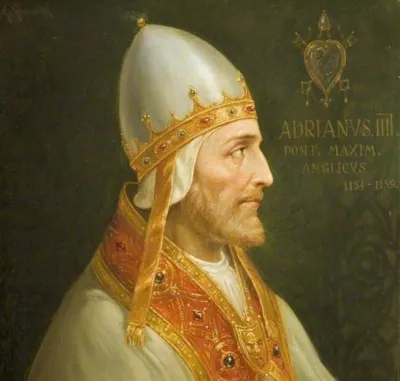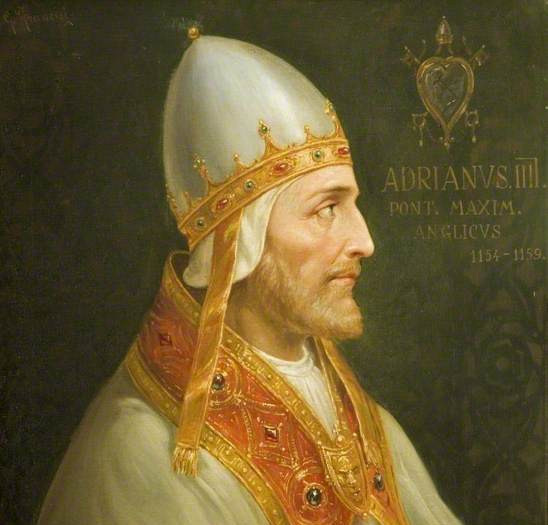Famous people in Three Rivers - a Ragamuffin from Bedmond
BUT the only Englishman to attain the Ecclesiastical Heights - Pope Adrian IV

Information taken from: The English Pope, George F. Tull, Wikipedia & other sources consulted.
Joy Mann 6th July 2016 [ALLHS and Three Rivers Museum Trust]

(c) Hertfordshire County Council; Supplied by The Public Catalogue Foundation[/caption]
Nicholas Breakspear was born c.1100 at Breakspear Farm in the hamlet of Bedmond in the Parish of Abbots Langley.
His father had become a monk in St Albans Abbey possibly to escape poverty farming in Bedmond. Nicholas' father must to have had the educational level demanded to become a postulant.
William of Newburgh (1136-1208) a 12th century commentator and historian wrote that Nicholas was “too poor to pay for his education” but “frequented the monastery for his daily subsistence.”
Young Nicholas joined the lower ranks of the Abbey at St Albans where the monks would have got to know him well and taught him as best they could. With all their efforts he still did not come up to expectations and let alone the expectations of his father. It seems this was the wrong place for him and he moved on.
To broaden his horizons, Nicholas took a trip to France. His first stop was Paris and the Basilica of St Denys where he worked and studied. This time he studied hard. Journeying further south, he met a renowned Irish scholar, Marianus, who became friend and mentor. He travelled on to Avignon in deep south-east France.
He would have chosen Avignon as a destination because in 1129 it had set up an autonomous administration under the local bishops and was a religious centre and later the seat of Popes until it eventually joined France in the 18th century. At Avignon he did qualify as a monk in the Augustinian Priory of St Rufus. 12th centuryWilliam of Newburgh again tells us that Nicholas "was lifted, as it were from the dust, to sit in the midst of princes and to occupy the throne of apostolical glory."
He had gained much during his years travelling and arrived in Avignon more worldly-wise. Again William of Newburgh comes to our rescue with a description, "He was of excellent abilities and fluent of speech, of ready obedience." It seemed he was easy to get on with and had a thirst for learning. He had come a long way from his childhood days as the ragamuffin from Bedmond. Unfortunately with advancement he gained a penchant for strictness and caused a revolution among the brethren which led to a command from Pope Eugenius III to go and see him in Rome.
Pope Eugenius immediately recognised this was a man with special qualities. First he promoted him to be Cardinal Bishop of Albano, which was a small diocese in the Alban Hills south of Rome, in 1146.
Nicholas' gift for negotiation and people skills caught the attention of Pope Eugenius who sent him as his personal ambassador (legate) to war-torn Scandinavia to negotiate an ecclesiastical re-organisation of the three kingdoms, Denmark, Norway and Sweden. It had been English missionaries who had converted these countries to Christianity and they would accept him more readily. Nicholas travelled via his native England where he was welcomed with honour. On reaching Norway it was found that he had just the skills needed to bring peace to the people and he gained the title"the Apostle of the North" according to Icelandic historian Snorri Sturleson.
He returned to Rome to find the now elderly Pope Eugenius III had died and been succeeded by Anastasius who died a yearlater. Sitting in conclave in December 1154 he was unanimously acclaimed the new Pope and chose the name Adrian IV. He was a very popular Pope. In 1155 he crowned Frederick I as Emperor, which he must have regretted later because Frederick became a tyrant and gained the nickname "Barbarosa". Nicholas found the position of Pope to be a burdensome one “full of sharp spikes".
He was famous as a preacher and spoke beautifully and had a resolute character. He gave recognition to the lowliest of those in church service. He attempted to resolve the destructive localised wars in Italy and he did what he could to exult St Albans Abbey in England, in memory of his father.